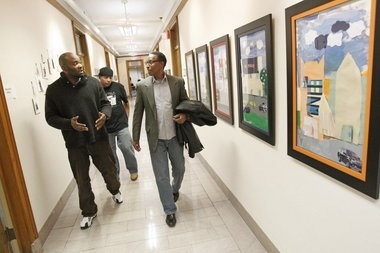Marquette Williams kept his promise. Just like a responsible father should.
For the past year, the Los Angeles filmmaker has been in and out of Cleveland working on a documentary, “Fatherhood 101,” that celebrates fatherhood and informs men about programs that can help them. Several programs offered by the Cuyahoga County Fatherhood Initiative are highlighted in it.
Williams, 40, a married father of three who grew up in Twinsburg, vowed the documentary would come out in time for Fathers Day 2013 and that he would premiere it in Cleveland.
Proudly, he has met those goals. “Fatherhood 101” screens five times this weekend at Tower City Cinemas in downtown Cleveland: 7 p.m. Thursday; 2 and 4 p.m. Saturday, and 2 and 4 p.m. on June 16, Father’s Day.
His hope is that you’ll take your dad to see it rather than buying him a tie or a drill.
Use the film to drill down into the importance of the father-child relationship in your own family. That’s a rare conversation, Williams now knows, after watching men take a seat on a stool to be interviewed, and one after another, begin to cry in front of the cameras.
That’s when he realized how unusual it is for men to be asked to talk about fatherhood.
“We don’t talk about how much we love our children. That’s not considered manly . . . and it’s definitely not considered cool,” says Williams, who grew up without his own biological father.
The strong, silent dad image has given rise to the perception that many men don’t care about their children.
But that’s not the case, Williams is convinced after interviewing more than 150 fathers. “They may not be in the home, for a myriad of reasons. In the movie, we try to talk about some. But all creatures love their offspring. That is an instinctual thing.”
It’s easy to understand how today’s young people are arriving at the maternity ward with zero context on the importance of fatherhood. One in three kids in the U.S. lives apart from dad, and two-thirds of all African-American children do.
But something needs to be done to stop the epidemic’s spread.
I applaud Williams for doing his part, with “Fatherhood 101.” A big part of his mission is “making fatherhood cool,” because he believes that is what’s missing.
“The proudest moments are going to come from your children,” insists Williams. “The Browns winning the Super Bowl can never compare to a parent getting their child potty-trained. Say what you want — but the day you stop wiping butts, that’s a great day.”
Williams has to be one of the funniest interviews I’ve conducted lately, especially when he described how much he learned when he attended a Cooking with Dad class in Cleveland. Apparently there were some moms in the room when he questioned why the instructor was rinsing off canned vegetables before cooking them. “The salt!” the women told him in outraged voices.
Nobody tells fathers these things, he laughs. “That’s a great class for a dad to take. I learned a lot. I’m sitting there filming it and I’m learning.”
It’s programs like these, which boost a father’s confidence and ability to raise his kids, that in the long run can save taxpayers millions, Williams is convinced. Studies show that when involved fathers are present, children are less likely to be incarcerated, live in poverty, drop out of school or become teen parents.
Although Williams did have “a really great stepfather,” he says it was still tough teaching himself the Xs and Os of fatherhood.
For example, “I never played baseball because that’s a father-son sport,” he says. But determined not to repeat his father’s mistakes, Williams bravely signed up his kids for T-ball when the time came.
“They laugh at me when I throw the ball,” he says, admitting he looks goofy at 6-foot-4 awkwardly fielding errant balls. “I know it doesn’t look that great. And I can’t say I look that cool doing it.
“But I am cool, because I’m doing it,” he says.
Williams interviews famous fathers like Grant Hill and Alan Thicke, but he also introduces us to some invisible men, the kind who handle their business but never get the spotlight.
You meet John Carter of Twinsburg, the must-see story of the film. After becoming a teen father, he gave up his football scholarship, came home from college and got a job — which he has kept for 20 years. He is a steady role model to his children, who have graduated from high school and college.
His film isn’t all upbeat and positive. Williams is disturbed at how the child support system, and increasingly mothers themselves, see dads as a source of money and no more.
Read more HERE

